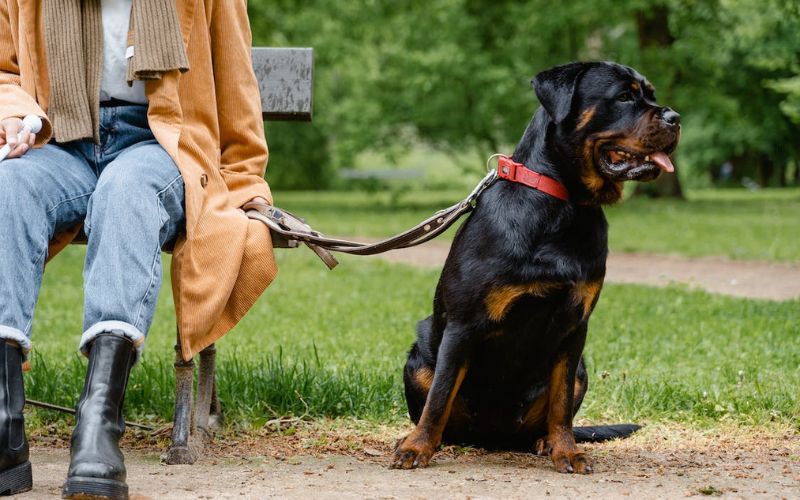When it comes to our furry companions, the question of whether certain breeds are dangerous to their owners often arises. One breed that sparks curiosity is the Rottweiler. So, are Rottweilers dangerous to their owners? Let’s dive in and explore the truth behind this popular query.
Many people may have misconceptions about Rottweilers due to their imposing size and strong appearance. However, it’s important to remember that a dog’s behavior is influenced by various factors including training, socialization, and individual personality. While some Rottweilers can display aggressive tendencies, this isn’t exclusive to the breed as any dog has the potential for aggression.
In reality, Rottweilers can be loyal, protective, and loving companions when provided with proper care, training, and socialization. Like with any dog, it is crucial for owners to establish themselves as the pack leader and provide consistent boundaries to ensure a well-rounded pet. So, rest assured, with responsible ownership, Rottweilers can make great companions and pose no inherent danger to their owners.

Are Rottweilers Dangerous to Their Owners?
Rottweilers are often portrayed as aggressive and dangerous dogs, but is this reputation justified? In this article, we will delve into the truth behind the perception of Rottweilers as a dangerous breed. We will explore their temperament, behavior, training, and the factors that can influence their potential for aggression. By the end, you’ll have a better understanding of whether Rottweilers pose a danger to their owners or if they are simply misunderstood.
The Temperament of Rottweilers
Rottweilers are known for their strong and confident temperament. They are loyal, intelligent, and protective of their families. While these characteristics make them excellent guard dogs, they can also raise concerns about their potential for aggression. It’s important to remember that a dog’s temperament is not solely defined by its breed, but also by its individual personality, upbringing, and training.
Proper socialization and early training play a crucial role in shaping a Rottweiler’s behavior. Positive reinforcement techniques should be used to teach them appropriate behavior and ensure they understand their place in the family hierarchy. By establishing clear rules and boundaries, Rottweilers can be well-behaved, obedient, and loving companions.
Rottweilers and Aggression Factors
While Rottweilers can be loving and gentle with their owners, there are several factors that can contribute to aggressive behavior. One of these factors is poor socialization. If a Rottweiler is not exposed to different people, animals, and environments from a young age, they may become fearful or defensive in unfamiliar situations, leading to aggression. It’s essential to expose them to a variety of stimuli and provide positive experiences to avoid these issues.
Another potential factor is inadequate training or harsh treatment. Rottweilers respond best to positive reinforcement training methods that focus on reward-based techniques. Harsh punishment or aggression towards the dog can lead to fear, anxiety, and defensive behavior, increasing the risk of aggression towards both strangers and their owners.
Finally, certain individuals may have a genetic predisposition towards aggression. It’s important to obtain a Rottweiler from a reputable breeder who prioritizes temperament and health. Responsible breeders carefully select breeding stock to minimize the risk of aggressive tendencies. However, it’s crucial to remember that genetics alone do not determine a dog’s behavior; proper training and socialization are still essential.
The Importance of Responsible Ownership
Owning any dog, including a Rottweiler, comes with significant responsibilities. To ensure a happy and safe relationship with your Rottweiler, consider the following tips:
- Start training and socializing your Rottweiler from a young age.
- Provide them with regular exercise to channel their energy and prevent boredom.
- Establish clear rules and boundaries to help them understand their place in the family.
- Monitor their interactions with children and other pets.
- Always use positive reinforcement techniques and avoid harsh punishment.
- Seek professional help if you encounter any behavior issues.
By being a responsible owner and investing time and effort into training and socialization, you can build a strong bond with your Rottweiler and minimize the likelihood of aggression.
Rottweilers and Families
Rottweilers can make excellent family pets when raised in a loving and responsible environment. Their protective nature means they can be great with children and are often very affectionate towards their family members. However, caution should be exercised when introducing them to new people or situations, especially if you have an untrained or poorly socialized Rottweiler.
Keeping Rottweilers Safe and Happy
To ensure the safety and happiness of both you and your Rottweiler, it’s crucial to provide them with a stimulating and fulfilling life. Here are some important aspects to consider:
Exercise:
Rottweilers are an active and energetic breed, so regular exercise is essential. Provide them with daily walks, playtime, and mental stimulation to keep their minds and bodies engaged. This will help prevent behavioral issues related to boredom or excess energy.
Nutrition:
A healthy and balanced diet is vital for the overall well-being of your Rottweiler. Consult with your veterinarian to determine the appropriate type and amount of food for your dog’s age, size, and activity level. Avoid overfeeding, as obesity can contribute to health problems in Rottweilers.
Veterinary Care:
Regular veterinary check-ups, vaccinations, and preventative care are crucial to ensure your Rottweiler stays healthy. Discuss with your veterinarian about preventive measures such as flea and tick control, heartworm prevention, and routine dental care.
Mental Stimulation:
Rottweilers are intelligent dogs that need mental challenges to thrive. Provide them with puzzle toys, interactive games, and training sessions to keep their minds sharp and prevent boredom.
Rottweilers and Other Pets
Introducing a Rottweiler to other pets requires careful consideration and a gradual process. Proper socialization and training play a crucial role in ensuring a peaceful coexistence. Always supervise interactions between your Rottweiler and other animals, especially in the early stages. With proper introductions and a positive environment, Rottweilers can learn to live harmoniously with other pets.
Rottweilers: A Misunderstood Breed
In conclusion, Rottweilers are not inherently dangerous to their owners. Like any other breed, their behavior depends on various factors such as genetics, early socialization, and responsible ownership. With the right training, socialization, and care, Rottweilers can be loyal, loving, and well-mannered companions. It’s crucial to challenge the misconception that they are inherently dangerous and instead focus on responsible breeding, training, and ownership.
Key Takeaways: Are Rottweilers Dangerous to Their Owners?
1. Rottweilers can be loyal and loving companions when raised and trained properly.
2. Like any dog breed, individual behavior can vary, but aggression is not inherent to Rottweilers.
3. Early socialization and obedience training are crucial to prevent any potential issues.
4. Responsible ownership, including providing proper care, exercise, and mental stimulation, is essential.
5. It’s important to educate yourself about the breed, understand their needs, and be aware of any breed-specific legislation in your area.
Frequently Asked Questions
Welcome to our informative FAQ section where we’ve compiled the most commonly asked questions about Rottweilers and their potential danger to owners. Here, we’ll address your concerns and provide insight into the temperament and behavior of these loyal dogs.
1. What factors should I consider when assessing the temperament of a Rottweiler?
A Rottweiler’s temperament is influenced by various factors, such as genetics, socialization, and training. It’s important to evaluate the dog’s lineage, as well as the environment in which they were raised. Proper socialization and early training are crucial to shaping a Rottweiler’s behavior. Additionally, factors such as breed health, exercise, and mental stimulation play a role in their overall demeanor.
However, it’s important to note that although Rottweilers tend to have a protective nature, the majority of them are not inherently dangerous. Like any breed, individual personalities may vary, and some Rottweilers may exhibit more aggressive traits if not properly trained or socialized.
2. How can I ensure that my Rottweiler is well-behaved and safe around my family?
Creating a safe and harmonious environment between your Rottweiler and your family involves consistent training and socialization. Proper obedience training helps establish boundaries and ensures that your Rottweiler understands basic commands.
Early socialization is equally important. Expose your Rottweiler to various people, animals, and environments from a young age to help them develop confidence and become comfortable in different situations. Consistency, positive reinforcement, and regular exercise are key to a well-behaved and happy Rottweiler.
3. Are Rottweilers more prone to aggression compared to other dog breeds?
Contrary to popular belief, Rottweilers are not inherently more aggressive than other dog breeds. While they possess protective instincts, their behavior largely depends on their upbringing and environment.
It’s crucial to remember that any dog, regardless of breed, can display aggressive behavior if not properly trained, socialized, or exposed to positive experiences. Responsible ownership and early intervention, if any behavioral issues arise, are essential in preventing aggression.
4. Are there specific warning signs I should look out for in a potentially dangerous Rottweiler?
As with any dog breed, there are warning signs that may indicate potential aggression in a Rottweiler. These signs include intense and prolonged staring, growling or snarling, bared teeth, raised fur along the back, or a stiff and rigid body posture. It’s important to understand that these behaviors do not automatically mean a Rottweiler is dangerous, but they should be taken seriously and addressed through proper training and professional guidance.
If you notice these warning signs, seek advice from a professional dog behaviorist or trainer who can assess the situation and provide appropriate guidance to address any potential issues.
5. Can Rottweilers be safe and gentle with children?
Rottweilers are known for their loyalty and protective nature, making them potential family dogs. When raised and socialized properly, Rottweilers can be affectionate, tolerant, and gentle with children. However, it’s important to always supervise interactions between dogs and young children to ensure safety for both parties.
Teaching children how to interact respectfully with dogs, such as not bothering them while eating or sleeping, is crucial. Additionally, proper training and socialization from an early age help ensure that your Rottweiler understands appropriate behaviors around children, making them a wonderful addition to a family.

Summary
Rottweilers can be dangerous, but it’s not because they’re born that way. It’s how they’re raised.
If owners provide proper training, socialization, and care, Rottweilers can be loyal and loving companions. However, neglect, abuse, and lack of training can lead to aggressive behaviors.
It’s important for potential owners to understand the responsibility that comes with owning a Rottweiler and to provide them with the love and attention they need to thrive. With the right care, Rottweilers can be safe and wonderful pets.
